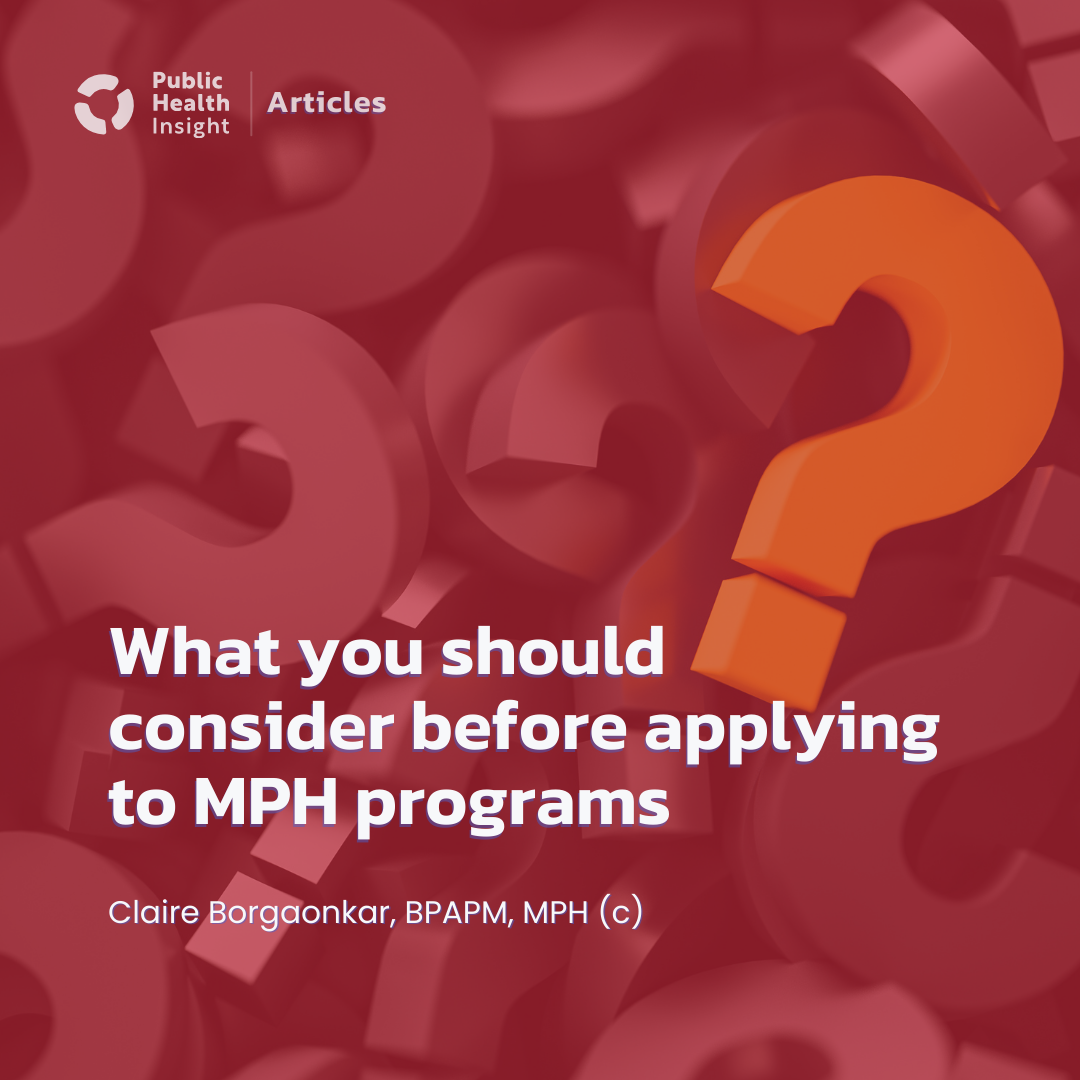
1/10/2023
“What I think is most important is that you’re feeling comfortable in a program that you think you can gain a lot out of to help advance your career.”
Leshawn Benedict
COO and Co-Founder of Public Health Insight
The COVID-19 crisis cast a light on the various specialities working to curb the impact of the pandemic. As a result, there has been a spike in interest in pursuing advanced degrees in public health. Future MPH students include those who have just completed or are about to finish their undergrads, practitioners who have been working in the field for some time, and professionals in other disciplines looking to shift into the public health stream.
Regardless of where you are in your academic or professional career, there are some questions to consider before submitting applications to public health programs. In episode 96 of the Public Health Insight podcast, co-hosts Leshawn Benedict and Gordon Thane reflect on their own experiences to help guide others as they prepare their applications and decide which public health master’s program to choose.
In this blog post, we’ll be looking into the search for the perfect public health master’s program match including:
The first step in researching which MPH program might be right for you is to ponder some basic practicalities and ask yourself….
These basic questions will help start to shrink the extensive pool of master’s level programs available in public health into a more manageable list of choices that meet your requirements.

Once you have a list of potential public health programs that meet your basic requirements, you can have a more in-depth look at each of the individual options to determine which streams are most suitable.
All master’s level programs in public health will include core topics such as epidemiology, biostatistics, and research methods. However, different programs will vary with some providing a more general curriculum while others are tailored towards specialization in a particular branch of public health. Having a look at what different institutions offer will help narrow the search for your ideal program.
MPH vs. MSPH/MScPH
One important consideration is whether to pursue a Master of Public Health (MPH) or a Master of Science in Public Health (MSPH/MScPH). In general, an MPH prepares students in a broad range of public health subjects and is geared for people who want to work in a more ‘hands-on’ public health role. The MPH stream may benefit future public health practitioners who are not yet sure about their ideal role in public health. MPH programs tend to have a more general focus, exposing students to a wide variety of public health themes. While students learn basic research methods and techniques, MPH programs tend to be more coursework-based. The MPH is often a ‘terminal degree’ with students ending their academic studies upon completion. However, opting for an MPH over an MSPH/MScPH degree does NOT preclude a student from going on to a PhD, DPH, or an academic/research-based career (Faubion, 2022; Healthcare Management Degree Guide, 2022).
By contrast, an MSPH/MScPH tends to be more research oriented and is generally intended for students who plan to progress in an academic setting as a public health researcher or professor. Students are encouraged to continue to doctoral studies after completion. While MSPH/MScPH programs include basic coursework, students will additionally be expected to complete and defend public health research thesis. Although the MSPH stream generally steers students towards academia, this degree does NOT preclude students from pursuing a career working in a non-academic, practice focused public health role (Faubion, 2022; Healthcare Management Degree Guide, 2022).
The choice between an MPH and MSPH/MScPH degree should be made with future career goals in mind. However, neither degree will close off opportunities in public health with both providing a solid foundation to launch a public health career.
Target student group
An advanced degree in public health appeals to potential students from a broad range of experiences. Many programs will tailor their curriculum and teaching methods to a specific group of students. Programs designed for students who are directly entering their master’s degree from an undergraduate degree may not be as interesting for those who have been in the workforce for several years. By contrast, it may be difficult for freshly graduated bachelor’s recipients with little professional experience to participate in programs designed for people who have already been working in the public health field. Researching your desired program can help determine if it is intended for new graduates, veterans of the public health arena, career shifters, or to be geared to incorporate students from any stage of their career.
Accreditation
Depending on where you are in the world and what your future career goals may be, it may be worth considering whether a public health program is CEPH accredited.
The Council for Education on Public Health (CEPH) is an American accrediting body. CEPH accreditation ensures that a public health program meets specific quality standards. Certain employers, particularly in the United States, may require applicants to hold a degree from a CEPH accredited school. Likewise, some funding and scholarship opportunities are only available for CEPH accredited programs (CEPH, 2022).A list of accredited schools can be found on the CEPH website.
Admissions Requirements
Now that you have a list of public health master’s programs that fit your needs, it is time to make sure that you meet theirs. Before filling out applications, make sure you can fulfill the admissions requirements and have all of the required documentation on hand. This can include:
Key Takeaways
The decision to embark on the next stage of an academic journey can be both exciting and daunting. The colossal number of available programs further complicates the choice to pursue a master’s degree in public health. Carefully thinking through the program elements that are crucial to you, your circumstances, and your career progression before sending out applications can help start you on the right path.
Written by: Claire Borgaonkar
CEPH. (2022). Students’ Frequently Asked Questions. Retrieved September 7, 2022, from Council on Education for Public Health website here.
Faubion, D. (2022). MPH vs. MSPH – Which Public Health Degree is Right for You? Retrieved September 7, 2022, from NursingProcess.org website here.
Healthcare Management Degree Guide. (2022). What is the Difference Between a MPH and MSPH? Retrieved September 7, 2022, from Healthcare-Management-Degree-Guide.net website here.